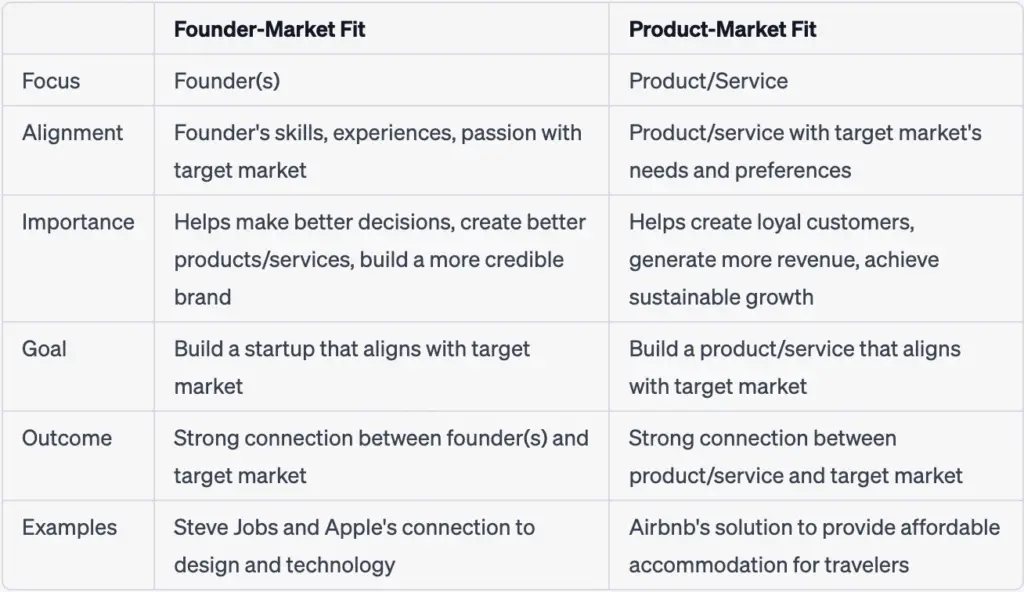Why Founder-Market Fit Is Essential to Startup Success?
Are you thinking of starting a business? If yes, then you must have come across the term “founder-market fit.” But what exactly is it, and why is it crucial for startup success? Let’s dive into the mechanics of founder-market fit, its importance, advantages, disadvantages, and limitations.
What is Founder-Market Fit?
Founder-market fit is the alignment between a startup’s founder(s) and the target market they serve. In other words, it is the degree to which the founder(s) possess the skills, knowledge, and experience required to understand the target market’s needs and preferences.
For instance, if a founder has experience in the healthcare industry and starts a healthcare startup, they have a better understanding of the market than a founder who has experience in the tech industry. As a result, the former is more likely to succeed due to their founder-market fit.
Advantages of Founder-Market Fit
Founder-market fit offers numerous advantages to startups, such as:
- Improved Decision Making: When a founder understands the target market’s needs and preferences, they can make informed decisions on product development, marketing strategies, and pricing.
- Better Product-Market Fit: With a deep understanding of the market, founders can create products that resonate with the target audience, resulting in better product-market fit.
- Increased Credibility: If a founder has experience in the industry they are targeting, they are more likely to gain credibility and trust from potential customers, investors, and partners.
- Easier Fundraising: Investors prefer to invest in startups with a founder who has a deep understanding of the target market, as they are more likely to succeed.
Disadvantages of Founder-Market Fit
As with any business strategy, founder-market fit has its disadvantages. Some of them are:
- Limited Scope: Founders with industry-specific knowledge may have a limited scope of ideas and may not be able to think outside the box.
- Limited Network: Founders may only have a limited network within the industry they have experience in, which may hinder their ability to connect with potential customers, partners, and investors outside their network.
- Overconfidence: A founder with industry-specific knowledge may become overconfident and ignore the changing market trends and customer preferences.
Limitations of Founder-Market Fit
Founder-market fit is not suitable for all startups. Some of the limitations are:
- Not Suitable for New Industries: If a startup is in a new or emerging industry, founder-market fit may not be possible, as no founder may have experience in that industry.
- Cost: Hiring a founder with industry-specific knowledge may be costly for a startup, especially if they are in the early stages.
- Limited Talent Pool: The talent pool for founders with industry-specific knowledge may be limited, resulting in a higher demand and cost.
Importance of Founder-Market Fit
Founder-market fit is essential for the following reasons:
- Minimizes Risk: A founder with industry-specific knowledge can minimize the risk of failure by understanding the target market’s needs and preferences.
- Increases Efficiency: A founder with industry-specific knowledge can create efficient processes and systems, resulting in lower costs and higher profits.
- Improves Productivity: A founder with industry-specific knowledge can provide guidance and mentorship to their team, resulting in increased productivity and efficiency.
Difference between Founder-Market Fit and Product-Market Fit
Founder-market fit and product-market fit are two essential concepts that are related but differ in their focus and scope.
Founder-market fit is the alignment between a founder’s skills, experiences, and passion with the target market they aim to serve. It’s about finding the right founder(s) to build a successful startup that caters to a specific market. This fit ensures that the founder(s) have the necessary knowledge, skills, and experience to understand and solve the target audience’s problems effectively. In other words, founder-market fit is about creating a strong connection between the founder(s) and the target market.
On the other hand, product-market fit is the alignment between a product or service and the target market’s needs and preferences. It’s about finding the right solution that fits the target audience’s needs, preferences, and pain points. A product-market fit ensures that the product or service offered meets the target audience’s expectations and solves their problems effectively. In other words, product-market fit is about creating a strong connection between the product/service and the target market.
The main difference between founder-market fit and product-market fit is their focus. Founder-market fit focuses on the founder(s) and their connection to the target market, while product-market fit focuses on the product/service and its connection to the target market.
However, it’s worth noting that both concepts are essential for startup success. A strong founder-market fit can help founders make better decisions, create better products/services, and build a more credible brand. A strong product-market fit can help startups create loyal customers, generate more revenue, and achieve sustainable growth.
In summary, founder-market fit and product-market fit are related but differ in their focus and scope. Founder-market fit is about finding the right founder(s) to build a startup that aligns with the target market, while product-market fit is about finding the right product/service that aligns with the target market’s needs and preferences. Both concepts are essential for startup success, and founders should focus on achieving both to create a strong and sustainable startup.

Types of founder-market fit
Founder-market fit is a crucial element that can determine the success or failure of a startup. When a founder has a strong connection with the target market, they can better understand the market’s needs, create better products or services, and establish a credible brand that resonates with customers. Here are some different types of founder-market fit that can contribute to a startup’s success:
Expertise Fit
This type of founder-market fit occurs when the founder has deep knowledge, skills, or experience in the target market. For example, a healthcare professional starting a healthcare technology startup or a chef starting a food delivery startup.
Passion Fit
This type of founder-market fit occurs when the founder is passionate about solving a particular problem in the target market. For example, a founder who has a personal experience with a health issue and is passionate about creating a solution to help others in the same situation.
Domain Fit
This type of founder-market fit occurs when the founder has a strong connection to a particular industry or domain. For example, a founder who has worked in the automotive industry for several years, decides to start an electric vehicle startup.
Customer Fit
This type of founder-market fit occurs when the founder is a part of the target audience they are trying to serve. For example, a founder who is a college student starting a study tool startup for other college students.
Network Fit
This type of founder-market fit occurs when the founder has a strong network in the target market, which can help them access resources, customers, and partnerships. For example, a founder who has connections in the fashion industry starting a fashion tech startup.
It’s worth noting that a founder can have a combination of these different types of founder-market fit. The key is to identify the founder’s strengths and align them with the target market to create a strong connection. This connection can help the founder create a unique value proposition, build a strong brand, and establish a competitive advantage in the market.
Examples of Founder-market fit
- Steve Jobs and Apple: Steve Jobs had a strong passion for design and technology, and he built Apple around this passion. He understood the needs and preferences of the target market and created products that resonated with them. This helped Apple establish a strong brand and a loyal customer base.
- Mark Zuckerberg and Facebook: Mark Zuckerberg had a deep understanding of the social dynamics of college students, which helped him create a social networking platform that resonated with this target market. He built Facebook around the idea of connecting people and communities, which helped it become one of the most popular social media platforms.
- Sara Blakely and Spanx: Sara Blakely had a personal pain point of not finding comfortable and supportive undergarments, which led her to create Spanx. She understood the needs and preferences of women who wanted to look and feel confident in their clothes, and she created a product that addressed this pain point. This helped Spanx become a successful shapewear brand.
- Ben Silbermann and Pinterest: Ben Silbermann had a passion for collecting and organizing things, which led him to create Pinterest. He understood the needs and preferences of people who wanted to save and share visual content, and he created a platform that addressed this need. This helped Pinterest become one of the most popular visual search engines.
- Elon Musk and Tesla: Elon Musk had a passion for sustainable energy and transportation, which led him to create Tesla. He understood the needs and preferences of people who wanted to drive electric cars that were sustainable and high-performing, and he created a product that addressed this need. This helped Tesla become a successful electric car company.
In all of these examples, the founders had a strong connection with the target market, which helped them create products or services that resonated with the target market and establish a strong brand. This connection contributed to the success of these startups and their growth in their respective industries.
Founder-Market Fit Quiz
Take this quiz to find out if there is a good founder market fit for your startup.
Results
If you’re not sure or you answer “no” to many of these questions, it might be worth taking some time to assess whether you have the right fit before moving forward.
#1. Do the founders have a deep understanding of the market and the problems that customers in that market face?
Conclusion
Founder-market fit is crucial for startup success as it aligns the founder(s) with the target market they serve. It offers numerous advantages, such as improved decision-making, better product-market fit, increased credibility, and easier fundraising.
However, it also has its disadvantages and limitations, such as limited scope and network, overconfidence, cost, and a limited talent pool. Founders can achieve founder-market fit through market research, industry-specific knowledge, and building a diverse team.
Successful startups that achieved founder-market fit include Airbnb and Tesla, and it is applicable in various industries and sectors, such as healthcare and tech. Therefore, if you’re thinking of starting a business, consider your founder-market fit and how it aligns with your target market.






